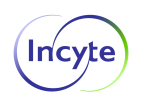- Jakafi® demonstrated superior overall response rate in patients with steroid-refractory chronic graft-versus-host disease at Week 24 compared to best available therapy
- Jakafi® demonstrated superior overall response rate in patients with steroid-refractory chronic graft-versus-host disease (GVHD) at Week 24 compared to best available therapy
- The study also met both key secondary endpoints, significantly improving patient-reported symptoms and failure-free survival
- GVHD is a serious and common complication of allogeneic stem cell transplants with no widely approved treatment options for patients who do not respond to steroids
WILMINGTON, Del.--(BUSINESS WIRE)-- Incyte (Nasdaq:INCY) today announced that the Phase 3 REACH3 study evaluating ruxolitinib (Jakafi®) in patients with moderate or severe steroid-refractory or steroid dependent chronic graft-versus-host disease (GVHD) met its primary endpoint of superior overall response rate (ORR) at Week 24 compared to best available therapy (BAT). In addition, the study also met both key secondary endpoints, significantly improving failure-free survival (FFS) and patient-reported symptoms assessed by the modified Lee chronic GVHD symptom scale (mLSS).
These topline results build on previously-reported positive data from the REACH1 and REACH2 trials, which demonstrated that Jakafi improved outcomes across a range of efficacy measures in patients with steroid-refractory acute GVHD. Data from the REACH3 study are expected to be presented at an upcoming major medical congress and will also be prepared for submission to the FDA seeking approval in patients with steroid-refractory or steroid dependent GVHD.
“These positive results from the REACH3 study are significant as they underscore the potential for Jakafi to provide a meaningful treatment option, not only for patients with acute GVHD, but also for the chronic form of the condition,” said Peter Langmuir, M.D., Group Vice President, Oncology Targeted Therapies, Incyte. “Based on the outcome of this Phase 3 study, we will move forward with the submission of these data to the U.S. FDA for this indication, which is a critical step as we work to bring this important therapeutic option to additional patients suffering from GVHD in the U.S.”
In 2019, Jakafi was approved by the U.S. Food and Drug Administration for the treatment of steroid-refractory acute GVHD in adult and pediatric patients 12 years and older, based on the positive results of the Phase 2 REACH1 trial. Jakafi is marketed by Incyte in the U.S.; ruxolitinib (Jakavi®) is licensed to Novartis ex-U.S.
About REACH3
REACH3 (NCT03112603), a randomized, open-label, multicenter Phase 3 study sponsored by Novartis and conducted in collaboration with and co-funded by Incyte, is evaluating the safety and efficacy of ruxolitinib compared with best available therapy in patients with steroid-refractory chronic GVHD.
The primary endpoint was overall response rate (ORR) at Day 1 of the Cycle 7 (Day 168) visit, defined as the percentage of participants demonstrating a complete or partial response. Secondary endpoints include change in the modified Lee chronic GVHD symptom scale score at Day 1 of Cycle 7, rate of failure-free survival (FFS) up to 36 months, best overall response (BOR), duration of response (DoR), overall survival (OS), among others. For more information about the study, please visit https://clinicaltrials.gov/ct2/show/NCT03112603.
About REACH
The REACH clinical trial program evaluating ruxolitinib in patients with steroid-refractory GVHD includes the randomized pivotal Phase 3 REACH2 and REACH3 trials, conducted in collaboration with Novartis.
The REACH program was initiated with the Incyte-sponsored REACH1 trial, a prospective, open-label, single-cohort, multicenter, pivotal Phase 2 trial (NCT02953678) evaluating Jakafi in combination with corticosteroids in patients with steroid-refractory grade II-IV acute GVHD. For more information about the study, including trial results, please visit https://clinicaltrials.gov/show/NCT02953678.
About Jakafi® (ruxolitinib)
Jakafi is a first-in-class JAK1/JAK2 inhibitor approved by the U.S. FDA for the treatment of polycythemia vera (PV) in adults who have had an inadequate response to or are intolerant of hydroxyurea, in adults with intermediate or high-risk myelofibrosis (MF), including primary MF, post-polycythemia vera MF and post-essential thrombocythemia MF and for the treatment of steroid-refractory acute GVHD in adult and pediatric patients 12 years and older.
Jakafi is marketed by Incyte in the United States and by Novartis as Jakavi® (ruxolitinib) outside the United States. Jakafi is a registered trademark of Incyte Corporation. Jakavi is a registered trademark of Novartis AG in countries outside the United States.
Important Safety Information
Jakafi can cause serious side effects, including:
Low blood counts: Jakafi® (ruxolitinib) may cause your platelet, red blood cell, or white blood cell counts to be lowered. If you develop bleeding, stop taking Jakafi and call your healthcare provider. Your healthcare provider will perform blood tests to check your blood counts before you start Jakafi and regularly during your treatment. Your healthcare provider may change your dose of Jakafi or stop your treatment based on the results of your blood tests. Tell your healthcare provider right away if you develop or have worsening symptoms such as unusual bleeding, bruising, tiredness, shortness of breath, or a fever.
Infection: You may be at risk for developing a serious infection during treatment with Jakafi. Tell your healthcare provider if you develop any of the following symptoms of infection: chills, nausea, vomiting, aches, weakness, fever, painful skin rash or blisters.
Skin cancers: Some people who take Jakafi have developed certain types of non-melanoma skin cancers. Tell your healthcare provider if you develop any new or changing skin lesions.
Increases in cholesterol: You may have changes in your blood cholesterol levels. Your healthcare provider will do blood tests to check your cholesterol levels during your treatment with Jakafi.
The most common side effects of Jakafi include: for certain types of MF and PV - low platelet or low red blood cell counts, bruising, dizziness, headache, and diarrhea; and for acute GVHD – low platelet, red or white blood cell counts, infections, and fluid retention.
These are not all the possible side effects of Jakafi. Ask your pharmacist or healthcare provider for more information. Tell your healthcare provider about any side effect that bothers you or that does not go away.
Before taking Jakafi, tell your healthcare provider about: all the medications, vitamins, and herbal supplements you are taking and all your medical conditions, including if you have an infection, have or had tuberculosis (TB), or have been in close contact with someone who has TB, have or had hepatitis B, have or had liver or kidney problems, are on dialysis, have a high level of fat in your blood (high blood cholesterol or triglycerides), had skin cancer or have any other medical condition. Take Jakafi exactly as your healthcare provider tells you. Do not change or stop taking Jakafi without first talking to your healthcare provider.
Women should not take Jakafi while pregnant or planning to become pregnant. Do not breast-feed during treatment with Jakafi and for 2 weeks after the final dose.
Full Prescribing Information, which includes a more complete discussion of the risks associated with Jakafi, is available at www.jakafi.com.
About Incyte
Incyte is a Wilmington, Delaware-based, global biopharmaceutical company focused on finding solutions for serious unmet medical needs through the discovery, development and commercialization of proprietary therapeutics. For additional information on Incyte, please visit Incyte.com and follow @Incyte.
Forward-Looking Statements
Except for the historical information set forth herein, the matters set forth in this press release, including statements about the timing of the presentation of the REACH3 data, whether and when such data will be submitted to the FDA, approved by the FDA as a treatment for moderate or severe steroid-refractory or steroid dependent chronic GVHD or commercialized in the U.S. or elsewhere, contain predictions, estimates and other forward-looking statements.
These forward-looking statements are based on the Company’s current expectations and subject to risks and uncertainties that may cause actual results to differ materially, including unanticipated developments in and risks related to: unanticipated delays; further research and development and the results of clinical trials possibly being unsuccessful or insufficient to meet applicable regulatory standards or warrant continued development; the ability to enroll sufficient numbers of subjects in clinical trials; determinations made by the FDA; the Company’s dependence on its relationships with its collaboration partners; the efficacy or safety of the Company’s products and the products of the Company’s collaboration partners; the acceptance of the Company’s products and the products of the Company’s collaboration partners in the marketplace; market competition; sales, marketing, manufacturing and distribution requirements; greater than expected expenses; expenses relating to litigation or strategic activities; and other risks detailed from time to time in the Company’s reports filed with the Securities and Exchange Commission, including its Form 10-Q for the quarter ended March 31, 2020. The Company disclaims any intent or obligation to update these forward-looking statements.
View source version on businesswire.com: https://www.businesswire.com/news/home/20200723005089/en/
Incyte
Media
Catalina Loveman
+1 302 498 6171
cloveman@incyte.com
Investors
Michael Booth, DPhil
+1 302 498 5914
mbooth@incyte.com
Source: Incyte
View this news release online at:
http://www.businesswire.com/news/home/20200723005089/en






